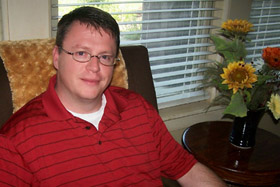
Physics major, mathematics minor
Principal member of technical staff, Sandia National Laboratories, Albuquerque, N.M.; assistant graduate program director, University of Arkansas
Highlight quote
"My experience at Hendrix has provided the foundation for the success that I have experienced as a research engineer."
Current projects
Principal investigator for the Neutron and Gamma Energy Transport (NuGET) radiation transport code; member of Radiological and Criticality Safety Committee and Annular Core Research Reactor Safety Committee; Nuclear survivability analyst; Nuclear Criticality Safety (NCS) Engineer; perform nuclear criticality safety evaluations for the SNL NCS program.
Undergraduate Research
During my junior and senior years at Hendrix, Scot Polk and I worked together with Dr. Robert Dunn and Dr. Warfield Teague on several different undergraduate research projects. The main project was the construction and operation of the large ring laser project in the basement of the Trieschmann Fine Arts Building. The results of my efforts on that project were summarized in a presentation to the 1996 National Conference of Undergraduate Research (NCUR) with the title "Large Ring Interferometers as a Potential Detector of Seismic Waves."This ring laser is very similar to the one constructed inside Acxiom Hall. Scot and I constructed another helium-neon laser cavity to attempt to use the resulting beam as a tool for Raman spectroscopy. Finally, Scot and I constructed intrusive and non-intrusive detectors for metallic ions in a hybrid rocket plume. Scot presented this research at 1996 NCUR with the title "Detection of Metallic Ions in a Hybrid Rocket Plume."
How Hendrix prepared me for success
My experience at Hendrix has provided the foundation for the success that I have experienced as a research engineer. Inside the classroom, the professors in all disciplines had the following expectations: (1) Students would be responsible for their own educational experience and get the most out of the time in class/study; and (2) Students would THINK about the lectures and assignments. Outside the classroom, research mentors enthusiastically shared their knowledge and experience to provide us with a basic understanding of how science should be done. Finally, the requirement that students take multiple classes outside their discipline area (for me, it was the Humanities and Social Sciences) provided me with additional tools typically needed by scientists/engineers to interact in a meaningful way with non-technically trained individuals in the workplace.
Future plans
During my time at Sandia, I have been an active mentor in the Student Intern Program. I am always looking for quality students that would benefit from a research experience in a national laboratory environment.
My advice
Develop an intuition about the problems in your field. Ask yourself, "Does this answer/approach make sense physically?"Computer simulations can be useful, but your conclusions should be based on real world experience or tied to predictions that can be validated. For natural science majors, take extra classes (above the minimum required) in the humanities and social sciences.